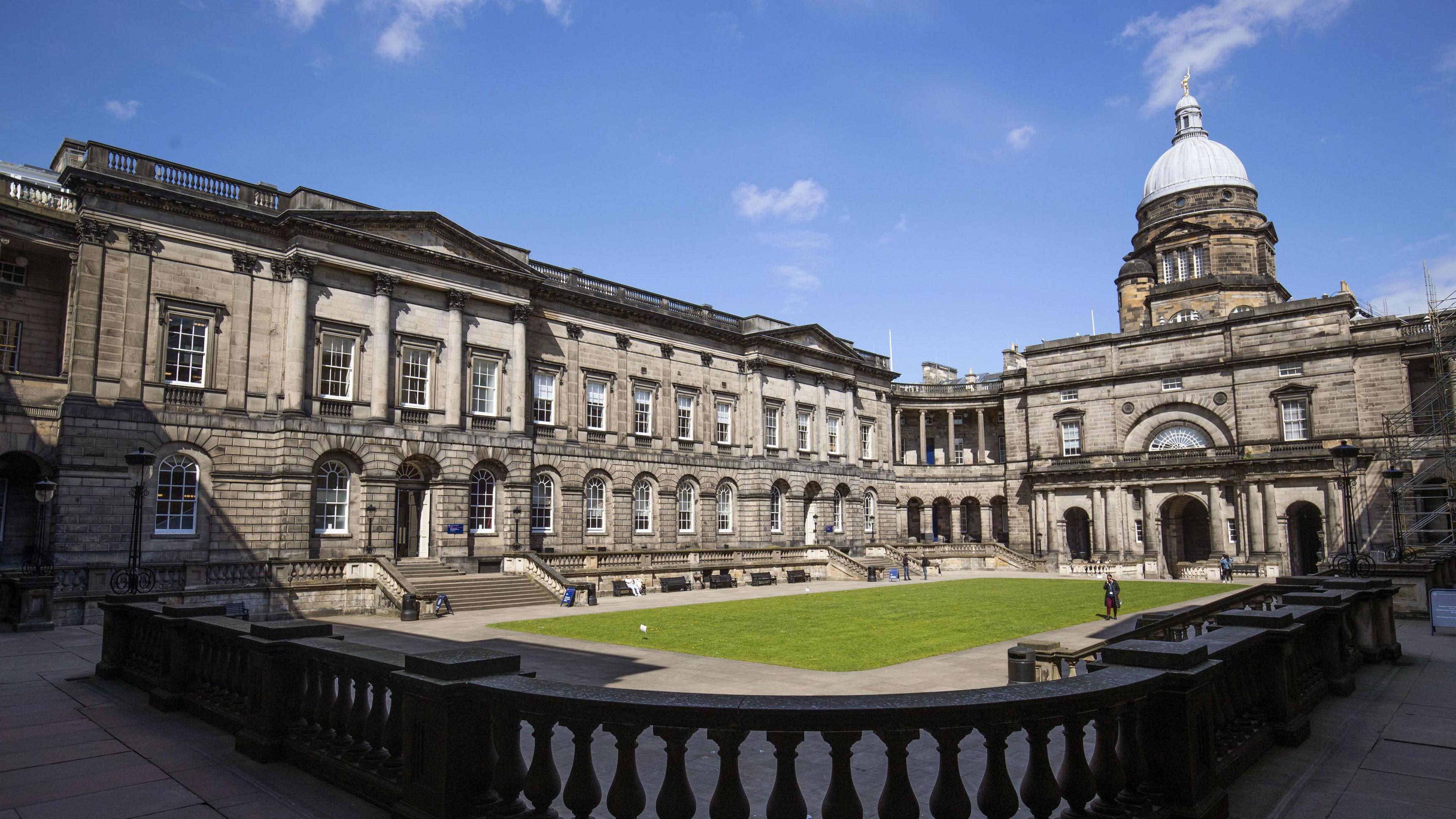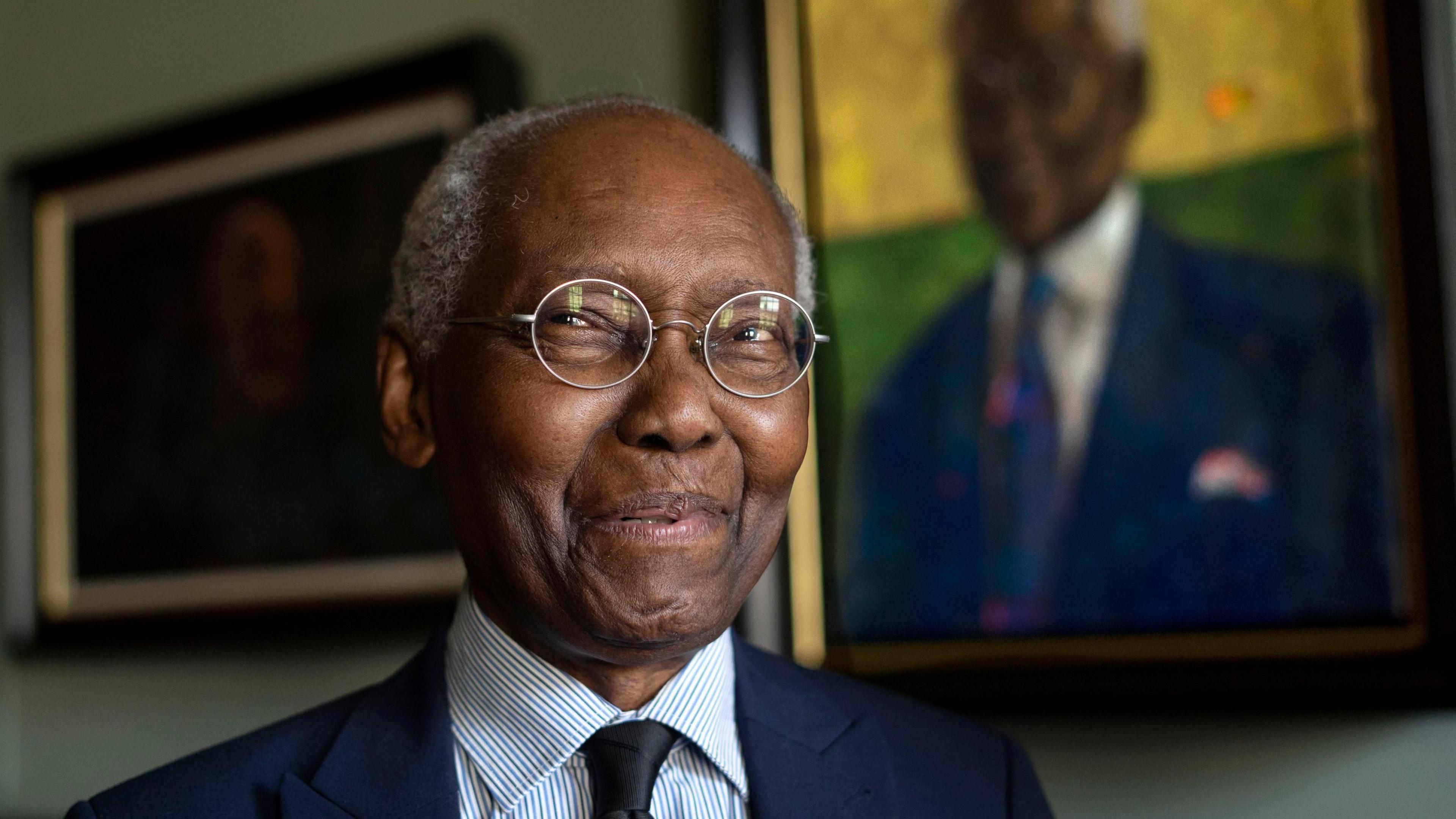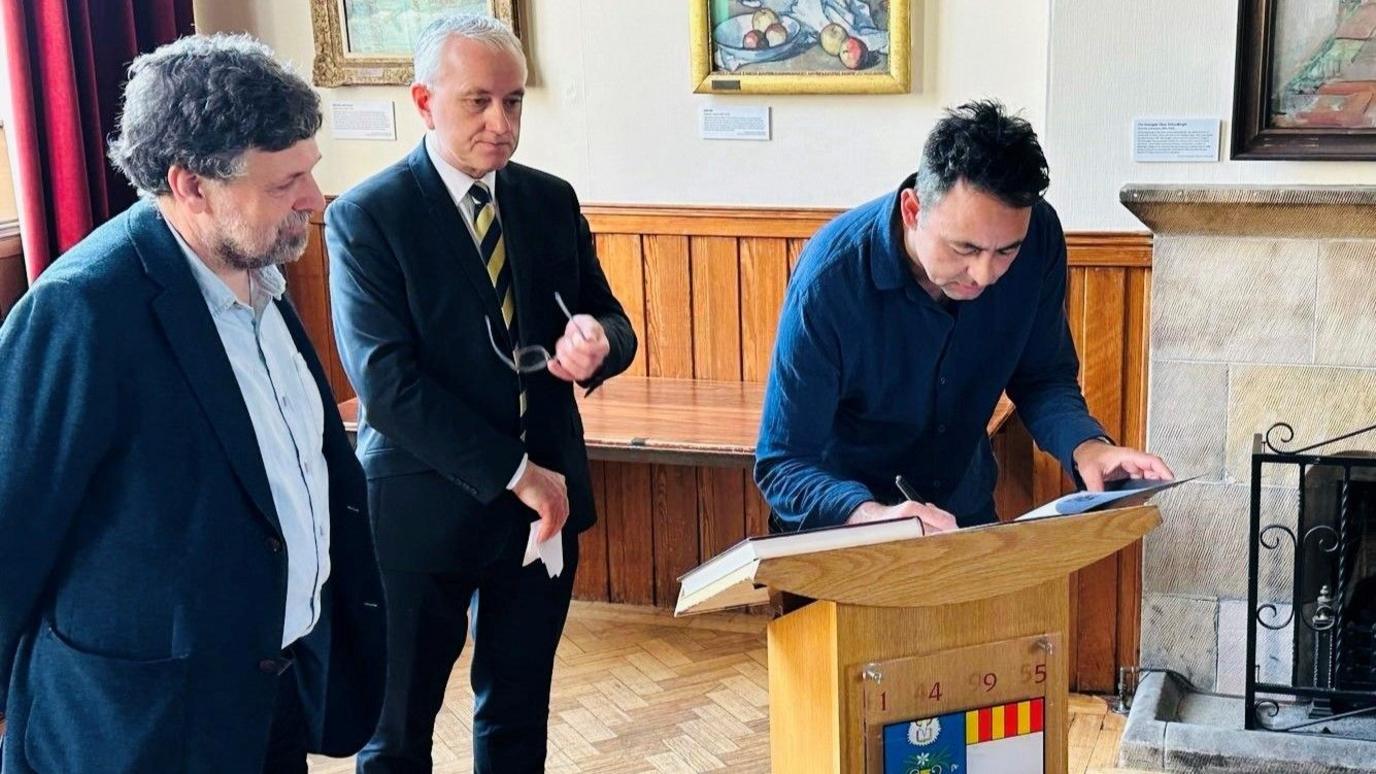Edinburgh University had major role in racist theories - review finds

A review has laid out how the University of Edinburgh profited from the slave trade and colonialism
- Published
The University of Edinburgh played a major role in the creation of racist theories and profited from slavery, a review has found.
Findings, published in the university's Race Review, external, lay out how it received at least the equivalent of £30m in "philanthropic gifts" which can be traced to the profits of colonial commodities like tobacco, sugar and cotton.
This money funded bursaries, scholarships and the construction of university buildings.
University principal and vice chancellor, Prof Sir Peter Mathieson, pledged to "learn and move forward" from the report, which was commissioned in 2021.
The work was overseen by Scotland's first black professor, Prof Sir Geoff Palmer, who had seen a draft of the review and contributed to feedback before he died in June.

Sir Geoff Palmer became Scotland's first black professor in 1989
The Race Review sought to identify some of the ways that the university was implicated in the practices and systems of enslavement and colonialism, as well as the apartheid and genocide of colonised people, in Australasia, Asia, Africa, the Middle East and the Americas.
It says it also "considers some of the consequences of these histories today in terms of statistical under-representation and the persistence of institutional and structural racism".
The report has been published online, amid a public pledge to address racial discrimination and inequality.
Archival research also examined how the "legacies of wealth" amassed from slavery and colonialism in the 17th and 18th centuries can be traced to contemporary endowments and capital campaigns.
It also looked at how leading thinkers of the Scottish Enlightenment, who were also prominent university figures in the 18th Century, promoted theories of racial inferiority and white supremacism used to justify colonialism.
The review points out that although the Enlightenment is often celebrated for its influence on modern liberal democracy, its thinkers were also responsible for nurturing "some of the most damaging ideas in human history".
Last year, the university funded further research into its historical links with Arthur Balfour, who played a key role in the creation of Israel and was a former chancellor of the university as well as a Conservative politician and prime minister.
'Intellectual giant' Sir Geoff Palmer dies aged 85
- Published13 June
New name for university tower after 'racism' outcry
- Published13 September 2020
Edinburgh University warns students not to be 'snobs'
- Published12 November 2024
Sir Peter said: "Only by fully engaging with and understanding the entirety of our institutional past can we truly learn and move forward.
"We are unwavering in our commitment to a future where racism, racial discrimination, and racialised inequalities have no place in higher education or society.
"We cannot have a selective memory about our past, focusing only on the historical achievements which make us feel proud."
He paid tribute to Sir Geoff Palmer - who became Scotland's first black professor in 1989 - and said the work would "honour his memory through our ongoing commitment to advancing race equality within our institution and in society more broadly".
In recent years there has been pressure on academic institutions to return exhibits linked with Britain's colonial past.
In 2019, the University of Glasgow agreed to raise and spend £20m in reparations after discovering it benefited by millions of pounds from the slave trade.
It was believed to be the first institution in the UK to implement such a "programme of restorative justice".
More recently, the University of Aberdeen repatriated a murdered Aboriginal man's remains, thought to have been obtained during a colonial conquest in Tasmania.
It is believed the young man was decapitated in the 1820s or 1830s - a time in Australia's history when colonisers used bounties to fuel a trade in tribespeople's body parts.
Modern day exploitation
However, there has been criticism of the report from a group of academics who said the University of Edinburgh was "guilty of hypocrisy of the highest order".
A spokesperson for Edinburgh University Staff 4 Free Speech, which claims to have more than 100 supporters, said: "By seeking to say sorry for events which occurred hundreds of years ago, Sir Peter Mathieson has used this study to deflect attention from the university's current murky relationships with organisations and governments which support modern day human exploitation."
The group cited examples including the institution's "silence" over Hong Kong pro-democracy abuses and China's internment camps for ethnic Uighurs while "cultivating highly lucrative contracts with the Chinese government".
What does the Edinburgh review recommend?
Among recommendations in the report was the creation of a naming approval committee to manage requests for naming or renaming university buildings.
This committee would consider how the university acknowledges its historic links to racism and colonialism on campus.
A response group identified actions as part of "reparative justice", including continued research into racial injustice, strengthening connections with minoritised communities, boosting scholarships, as well as reinforcing anti-racist educational programmes, after the findings.
The university pledged to achieve "meaningful change" and transparency, and to "learn from and repair its past".
Professor Tommy Curry, co-chairman of the Race Review's research and engagement working group, said the review demonstrates "a level of self-reflection that very few institutions have had the courage to embark on".
He said: "We have fundamentally changed what we understood as the Scottish Enlightenment.
"We have shown that the study of racial difference had a major home here, and that there are legacies of discrimination that we still have to correct today.
"We hope our findings will enable the University to emerge as a better version of itself. This sets a standard for other institutions to not only reconsider their historical perspectives and legacies, but also their institutional culture."
Fiona McClement, co-leader of the Race Review response group, added: "Our aspiration is to be an anti-racist organisation.
"We want to ensure that are a welcoming and nurturing environment in which all members of our community feel a sense of belonging, and can flourish and succeed without facing unjust racialised barriers."
- Published3 July 2024

- Published21 March
